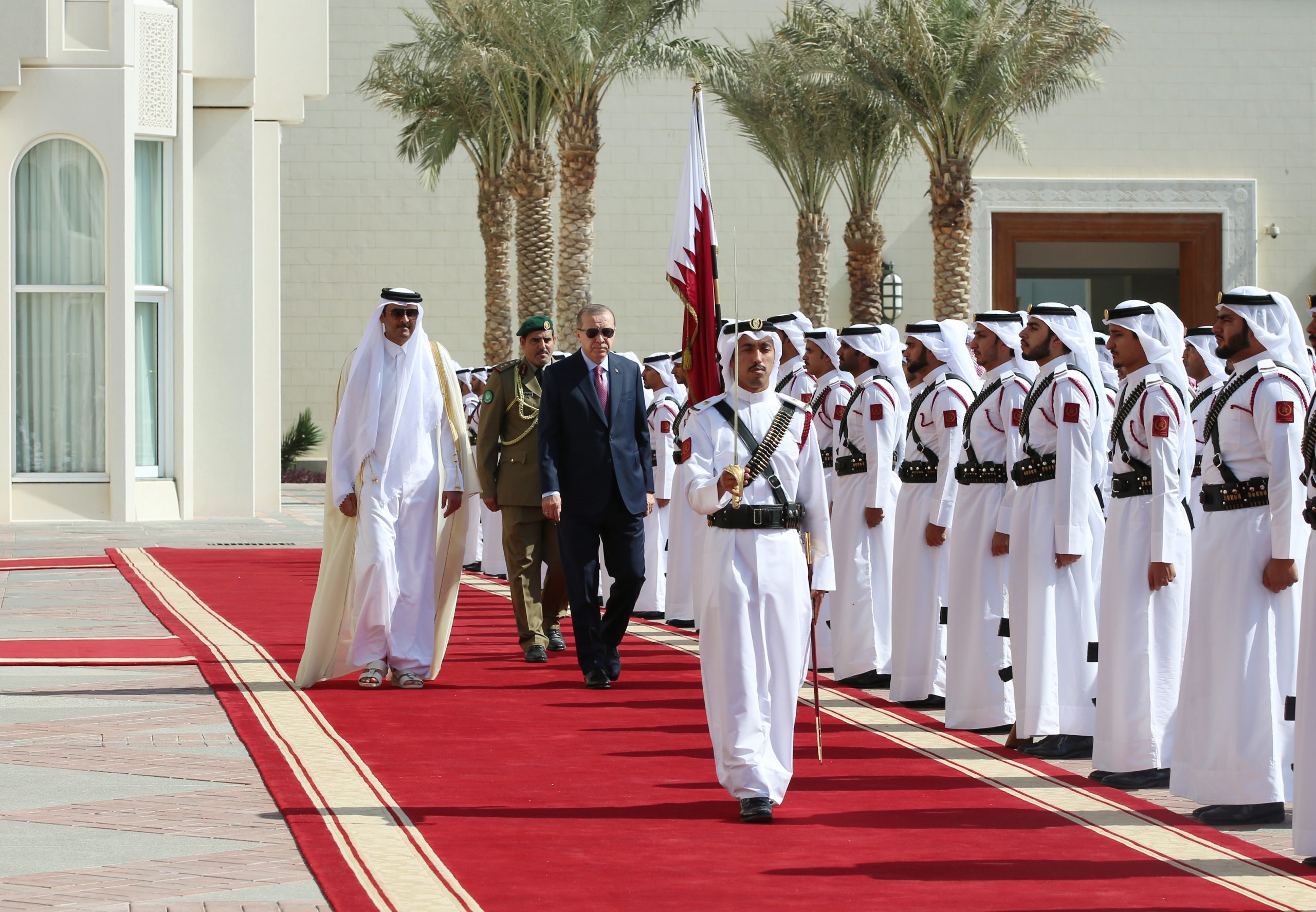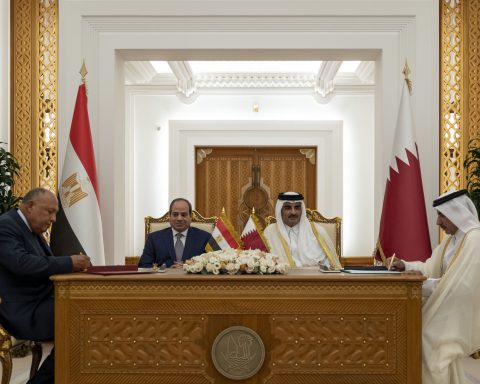Regional diplomacy has been engaging in a dynamic process for the sake of putting an end to the Gulf crisis that began in 2017. Strong signals indicating that a positive result will be accomplished through the talks involving the US, Saudi Arabia, and Qatar, and held under the mediation of Kuwait, are already reflected in the local and international media. Nevertheless, it is uncertain whether resolving the crisis would ease the cold wind that has been blowing across the region since 2017. As a matter of fact, many of the causes that provoked this crisis continue to exist. At this juncture, upon closer examination of the process leading to the crisis, how deep the crisis of confidence between the parties is can be seen.
The foundations of this crisis in confidence were laid in the wake of the Arab revolutions. Qatar’s supportive attitude towards the changes and social movements in the process of revolutions that began in Tunisia in 2010 and then spread to Egypt, Libya, Yemen, and Syria seriously disturbed the actors of the status quo, and in particular the UAE. Indeed, these actors did send Qatar a warning message with their support for the dismissal of the civilian President Mohamed Morsi in Egypt, a member of the Muslim Brotherhood. The main reasons for dissatisfaction with Qatar were its continued support for the Arab revolutions, its persistent policies that would harm the regional status quo and its pursuit of alliances that would impede the building of an alliance whose formation was initiated by Israel and the UAE. The rapprochement of Doha first with Mohamed Morsi and then with Turkey’s President Recep Tayyip Erdoğan was a crossing of their red lines.
Saudi Arabia, the UAE, and Bahrain withdrew their ambassadors from Qatar by a joint decision in March 2014, as Qatar did not change its position and maintained its rapprochement with Turkey after Morsi’s fall. They claimed that Qatar had “interfered in their domestic affairs” as a reason for the decision. This situation was indicative of an unprecedented crisis among the Gulf States. It was also revealing that a deepening of divergences could cause hard-to-recover damage. At that time, however, the crisis ended before it became even worse. A compromise was reached at the GCC summit in Riyadh in November 2014 and the aforementioned countries sent their ambassadors back to Qatar. Doha was given a stern warning with this crisis. Nevertheless, intending to maintain an independent stance in its foreign policy, Qatar made no changes and maintained its firm stance.
Qatar responded to this warning by building a stronger alliance with Turkey. In December 2014, Tamim bin Hamad Al Thani, Emir of Qatar, received President Erdoğan in Doha and an agreement was concluded, elevating relations between the two countries to the level of a strategic partnership. With this agreement, ratified in March 2015, Qatar allowed Turkey to establish a military base on its territory. This facility, the first military base Turkey opened in the Middle East and the Gulf region, caused serious disturbance in the UAE. Turkey has gradually increased the number of troops at the Tariq bin Ziyad base and this has served as a shield against any kind of threat against Qatar.
On the other hand, another consequence of the Gulf crisis in 2014 was that the other Gulf states, namely Oman and Kuwait, would not give in to Saudi Arabia’s and the UAE’s attempts to dominate the region. Indeed, these countries were also expected to withdraw their ambassadors from Qatar, but both governments maintained their neutral positions. Thus, the limits of the alliance led by Saudi Arabia and the UAE in the Gulf policy were set. But, as if they were unaware of this fact, these countries launched another “operation” against Qatar with a similar attack.
While there were two major developments in the process leading up to the 2017 crisis, none of them were directly related to the Gulf region. However, these developments were essentially the events that paved the way for the Gulf crisis. The first was the attempted coup in Turkey in 2016. Similar to the scenario put into practice in Egypt, a coup against the government of President Erdoğan was planned in Turkey; a process in which many internal and external actors were actively involved. While the Western media, especially the US media, were campaigning for the coup in Turkey, in order to create a chaotic atmosphere, some terrorist attacks were attempted in the country. At the moment when the attempted coup was taking place during the night of 15th July 2016, the state-controlled media in Saudi Arabia and the UAE published, without taking the course of events into account, that a coup had taken place, revealing the positions of these countries. Several months after the attempted coup, President Erdoğan and Foreign Minister Mevlüt Çavuşoğlu stated anonymously that a Muslim-Arab country had made 3 billion US dollars available to finance the coup attempt, which was interpreted by many circles as the UAE. The UAE first took the lead in overthrowing the Qatar-backed Morsi government and then targeted the Erdoğan government: two governments strongly allied with Qatar. The UAE was successful in its first initiative but could not succeed with its initiative against Turkey.
Another important development before the 2017 crisis was the presidency of Donald Trump. Following Trump’s inauguration, the UAE and Saudi Arabia convinced Trump to come closer to them with the help of the Israel lobby and using their own financial resources and ensured that Washington would remain silent if these countries launched an operation against Doha. Indeed, this is what happened. After taking over the Presidency, Trump made his first overseas visit to Riyadh, showing that he would give priority to an alliance involving Saudi Arabia, the UAE, and Egypt. Thus, shortly after Trump’s visit to Riyadh, Saudi Arabia, the UAE, Bahrain, and Egypt decided to suspend their political, military and economic relations with Qatar and imposed an air, sea and land embargo on the country. After the embargo, Trump tweeted that Qatar should end its support for radical groups. In a sense, he was falling into the trap of Abu Dhabi and Riyadh, and he openly supported the blockade against Qatar in a manner contrary to US interests.
On the other hand, the embargo imposers’ demands, in the context of the crisis, revealed their real motives. The 13-Article declaration drafted by these countries to resolve the crisis and lift the embargo was aimed, on the one hand, at Qatar’s foreign policy, which was gaining independence from the GCC, and, on the other, at blocking the Doha government’s alliance with Turkey. Among these demands, the articles on the cessation of Al Jazeera’s broadcasts, the restriction of relations with Iran and the closure of the Turkish military base were aimed not only at controlling Qatar’s foreign policy but also at erasing the country’s sovereignty. Indeed, many experts noted that the next phase of the crisis would be a military intervention against the leadership of Tamim bin Hamad Al Thani in Qatar. This possibility was removed when Turkey demonstrated its full solidarity with Qatar and showed, by rapidly mobilizing its forces, that it would react strongly to any military intervention. The Turkish Grand National Assembly held an extraordinary meeting immediately after the blockade, and while approving the new troop deployment to Qatar, it ensured the national security of Doha.
Qatar did well over the three years of the blockade and deepened its strategic alliance with Turkey. In this three-year period, during which Saudi Arabia and the UAE failed in all their foreign policy initiatives, Qatar, on the one hand, strengthened its relations with Turkey and other Gulf actors and, on the other, received serious diplomatic support at the international level. Meanwhile, Qatar also undertook an important capacity building process to combat these threats by identifying much more clearly the threats to its national security. Therefore, the losers of the Gulf crisis were not Qatar but the UAE and Saudi Arabia.
The end of the process, which lasted three years and harmed the countries that had imposed the embargo, notably Saudi Arabia rather than Qatar, can be seen as a victory for the Turkish-Qatari alliance in regional policy. The UAE, the alliance’s main adversary, could not achieve any results with its policy of hostility against Turkey and Qatar. On the contrary, it can be said that the UAE has become increasingly isolated during this period and is now trying to resolve its potential security concerns in the future through cooperation with Israel.
The UAE’s silence in the process of resolving the Gulf crisis while striving to deepen its alliance with Israel are actually a clear sign of this isolation. This situation makes the differences that have been observed for some time between Saudi Arabia and the UAE even more significant. Indeed, Saudi Arabia’s dialogue with Qatar to resolve the crisis can be interpreted as adding a new one to the recent growing disagreement between Abu Dhabi, which is considered the main contributor of the Gulf crisis, and Riyadh. The relationship between Saudi Arabia and the UAE can be defined as a “forced marriage” as they differ on almost all the issues on which they act together, including Yemen, which pushes them to the verge of being thrown to opposite ends.
The differences between Saudi Arabia and the UAE have recently become apparent, particularly on issues such as Yemen, relations with Iran, and policy towards Turkey. The UAE, by trying to establish an independent little state in the south of Yemen, in line with its own interests and by leaving Saudi Arabia alone in Yemen, is also looking for ways to cooperate with Iran. On the other hand, Saudi Arabia is taking steps to move closer to Ankara and is engaged in back channel diplomacy in this respect, which can be considered as an expression of its response to the UAE in regional policy. Meanwhile the UAE continues to insist on opposition to Turkey.
Finally, even if diplomatic relations between the parties were to be resumed, it would not be realistic to expect Qatar to enter a rapid process of détente towards its neighbours who have pursued a hostile policy against the country. To ensure that the consequences of the blockade, which has failed to achieve its objectives, do not become even more destructive, Saudi Arabia and the UAE will have to rethink their foreign policy, first by ceasing their hostile policy towards Qatar and then by adopting a constructive stance on regional policy.
The Turkish version of this article was published by Anadolu Agency on December 9, 2020.













